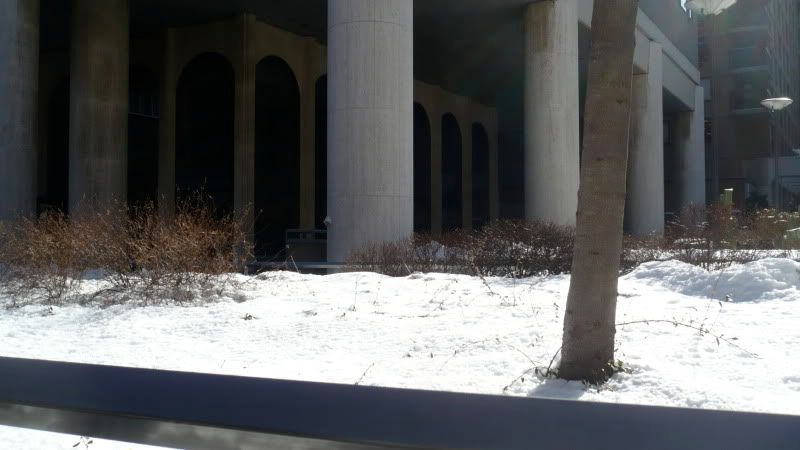I spent this weekend rewriting the second half of a project I will refer to as 'Bogus Ghost' (The full title being a bit long to type). This play is, in many ways, something of a twin to Other People's Garden Gnomes (which I can't really call "my last project" because I've written other pieces that I'm satisfied with since.) Both are about the process of grief. I started on my first draft of Bogus Ghost almost a year after I started on Other People's Garden Gnomes, shortly after OPGG enjoyed its first performance at my high school and a few months before it was performed, in slightly altered form, at
Blank YPF, and then workshopped at International Thespian Festival. These plays marked a departure for me- instead of writing for a competition (like "Izzy Icarus Fell Off the World") or for the high school stage (everything else), I was writing for
me.
In the last week of March 2008, my grandfather died, and then four days later a classmate was killed in a car accident.* OPGG had been a fairly rough idea before then, but after that, the only thing I was concerned with was putting my grief to paper and learning how to write it. Ultimately, Garden Gnomes became a tight little show about coping, control, and family. And then I started work on Bogus Ghost. Again, a study of grief, but from a different perspective. With OPGG, the reactions I put down were immediate and raw, with characters I collected from my life and from generic roles and then placed into their roles. I kept it deliberately removed from my life - while Ophelia is arguably my
Author Avatar , or as close to me as anyone in that show comes, she isn't me. Joe is, in retrospect, probably more based on my high school drama teacher than I liked to think at the time. But it was mostly imagined.
So then I guess that brings us to the cast of Bogus Ghost. Three characters. Two of them are
twofer token minorities, not for the sake of having a diverse cast but because that was how the characters came to me. And the whole thing started with the characters before it got a plot... I don't really know where the plot came from, honestly, but it's a pretty standard Teen Suicide Drama thing, I think. Anyway, let's take a look...
Lucid Lucille Carter: this is honestly the name on her birth certificate. She is biracial (or halfrican, she probably would call herself), the military brat daughter of a decorated, black vietnam vet and a woman who thinks it's still the summer of love. She is, by her very definition, a bit weird. She calls Allan by his full name always (no exceptions), and is in general a bit of an odd duck in her speech patterns and mannerisms. She is a very spiritual person, interested in ouija and voodoo, but also a bit of a cynic - while she accepts the existence of ghosts readily, she isn't so willing to interact with them. Luce is interested in "finding herself." She enjoys experimenting with identity and developing her own personal style. She is self-confident and assertive.
Allan Chang: I think someone dubbed him as a "gaysian" once? idk. As a character, Allan developed separately from Finn and Luce and was headed for a different continuity until I stuck him into this story. He's had a hard life in terms of his back story, and I don't make it easier by making him dead. (Not sure if
this trope applies or not here.) He and Finn have been, in-universe, best friends since practically infancy, with Allan being the leader in most respects. He is effortlessly smart, and although his internal understanding of himself is solid, his understanding of himself in relation to other people and the world in general is rocky. I suspect that he had great-great-grandparents who worked on the transcontinental railroad - in my mind, his family, although very traditionally "Asian," has been in the US a long time... His father is established as having been physically abusive, which I am told is atypical given his background, but let's go with it. Allan killed himself; even he doesn't know why. (this is his actual reason.)
Finn Stewart: I need to retire this damn name once I finish this script. I've used it for too many different characters. Finn is the token white guy, I guess... He's earnest and hardworking, and in terms of identity and personal security he's Allan's opposite. Finn has always been what you could call a "people" person. He gets along and he knows his place - he's a bit uncertain about his future but he figures he'll get there when he gets there. Internally, though, Finn is a wreck. He struggles with unmerited guilt and, although I will swear up and down that he's straight until the end of time, is probably a bit sexually insecure.
I never really know what a script is about until I finish it, and in this case, I think the underlying theme is identity. Of course there are other things at work, but these are all characters who are, for one reason or another, struggling to define themselves.
In OPGG, I became fascinated with the idea of a character who is defined by their absence (Ophelia's father). Original ideas called for him to appear, but I realized that after all I'd built him up to be, anything about him would be anti-climactic. Furthermore, it was a script about people dealing with loss, dealing with that hole in their lives that opened up, and it didn't make sense for him to appear when the whole play was dedicated to the opposite. With this script, it's more of an issue of a character who is dead but not quite gone, a ghost. When people die after an illness or after a long life, it feels more natural - some of the grieving process takes place before it's over. When it's sudden, though, it leaves a hole and it leaves questions, a lingering specter of that person who ought to still be there.
These two scripts have been a healing process and a learning process for me. Hopefully next I can write about something other than dead homosexuals for a change. ;)
-Leez.
*Like, seriously, nothing in either play is purposely based on real world events, I promise.










